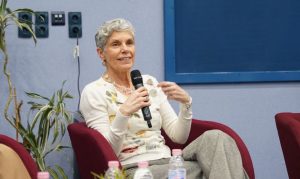The American University in Bulgaria (AUBG) hosted a thought-provoking discussion on gender equality at the Elieff Center in Sofia on March 7. On the eve of International Women’s Day, AUBG convened a panel of influential leaders hailing from diverse sectors – business, media, non-government, and education – to dissect the progress and challenges of gender equality in Bulgaria.
The dialogue, moderated by AUBG President Dr. Margee Ensign, brought together Nancy Schiller, President and CEO of the America for Bulgaria Foundation (ABF); Kamelia Slaveykova (EMBA’07), Chairman of the Board of Directors at Shell Bulgaria; Stefana Zdravkova, former CEO of Nova Broadcasting Group; Tony McMurray, Managing Director at Ingram Micro Bulgaria; and Emily Sargent-Beasley, President of the American College of Sofia.
“Thank you everyone for coming and I thank this amazing group of panelists who are here tonight,” President Ensign said. “We have incredible perspectives tonight to talk about a really important topic, gender equity.”
Shell first developed its Diversity and Inclusion Policy in 1997 when the global oil and gas corporation only had 4% women in managerial positions, Slaveykova said. The company “has made a lot of progress since then,” she continued, explaining that the share is now 33%, intending to reach 40% by 2030. There are 60% women on the company’s Executive Committee globally, and 67% female representation on the Board of Directors in Bulgaria.
Despite this progress, “gender equality is not only about data,” Slaveykova said. “It’s not only about metrics – which are important – but it’s about values. It’s about the culture and the journey that each company has to take, and the role of the leaders is very important. It’s important that the leaders really take care and express curiosity and also act with courage because the issues related to gender equality are quite sensitive.”


The next speaker was Tony McMurray, who said that 68% of his team at Ingram Micro Bulgaria are women and so are 100% of the leaders at the highest level. The company has also invested efforts in providing more flexibility for women on maternity leave, increasing part-time work from 3 to 8%. “So it’s actually a business positivity that we’re encouraging the mothers to come back early and utilize their skills, and utilize their flexibility,” he said.

ABF CEO Nancy Schiller spoke about the important role of education in advancing gender equality.
“We all know gender stereotypes start at a very early age and this needs to be addressed through education, through families, through society,” Nancy Schiller said. “And how do you do that? You educate at an early age.” The America for Bulgaria Foundation is supporting a variety of initiatives that address that problem, including the Trust for Social Achievement, the AreteYouth Foundation, Telerik Academy, and the Mentor the Young Program.
The next speaker for the evening was Nova Broadcasting Group’s former CEO Stefana Zdravkova. The media company “has always tried and promote and celebrate accomplishments of women” through investing in education and social entrepreneurship projects, she said. “It’s important to show the examples, it’s important not to be afraid to challenge the society, to use the power and the knowledge of our experts, to participate in events like these, to mentor young ladies,” Zdravkova added.


The American College of Sofia has a merit-based admission policy focused on equity in terms of the number of female and male students, Emily Sargent-Beasley said. 11 out of the 16 valedictorians at the school since 2008 were female, two thirds of students who sit ot the president’s list on average are female, and 55% of the student representation on the student government is female, she said.
“Clearly, there’s no question of capacity, right,” Sargent-Beasley said. “So really, what’s getting in the way? What do we need to teach our young people? The requirement across Bulgaria in our schools is to make sure that we have an approach to teaching our young people how to think critically, how to engage with care and consideration. And this happens both through a written curriculum and an experience curriculum. It has to happen in schools.”





